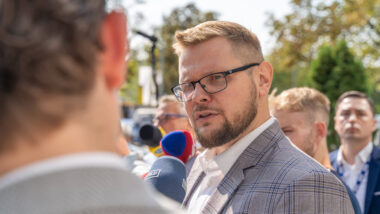The Panoptykon Foundation is a Polish NGO fighting against surveillance and for digital rights. One of its co-founders, way back in 2009, was Katarzyna Szymielewicz. Szymielewicz is still president of the foundation and leads its European advocacy work. We spoke to her at the margins of the Tech and Society Summit, where Europe’s civil society came together to discuss digital policy without big tech.
netzpolitik.org: What’s the biggest digital topic in Poland right now?
Katarzyna Szymielewicz: For us at Panoptykon, there is not really Poland and everything else – we think globally about digital problems because they operate across borders.
A key challenge remains how to reclaim the digital space, specifically social platforms. What we experience in Poland, and I believe in many other places, is the polarisation of the debate.
The recent change in government in Poland was a big shift in politics, but it did not influence this problem in a positive way. Society is deeply divided. I link that to how social media functions, how they make money, what advertisers expect. Right now, we have a closed ecosystem in which everybody plays the same game, apart from social media platforms, which are like a casino that always makes a profit on us losing.
If you asked politicians in Poland, I’m sure they would give you a different story. But I’m confident that if we fixed what is promoted in social media, that could be a massive change. I don’t see that coming from within the country, but I see a way in which we could work on it with the European Union. That’s definitely the issue that implicates so many other problems that I would start with this one, fixing recommender systems and their logic.
“No change”
netzpolitik.org: And the change of government at the end of last year changed nothing?
Katarzyna Szymielewicz: Absolutely not. The new government played on polarisation, they played everything that the previous government taught them is efficient. We still have politicians who are not solving problems because solving problems would bring them much less visibility.
A great example of that is the situation on the border. That was one of the very first things people expected to change – the second one being abortion, third maybe LBGTQ rights.
No change has happened, absolutely none. It doesn’t mean the topics don’t exist. The government simply doesn’t feel pressured to change its policy, because apparently we entered that state of post-democratic degradation in which you don’t have to change policies, you change narratives. Changing things is risky, discussing things on social media or on TV is not. So yeah, no good news.
netzpolitik.org: I imagine the management of the border is also a digital topic by itself?
Katarzyna Szymielewicz: It can be, yes. We are in the process of collecting examples of AI assisted surveillance systems and surveillance systems in general from the Polish administration. We hope that with the AI Act in place there will be public databases showing what AI surveillance systems are used in countries like Poland. As a sidenote, with all the exemptions the Council and the Parliament put in the AI Act towards the end of the trilogue, we are less sure of this happening.
We are trying to research these systems, but it’s incredibly difficult. There is no way we can get access to information. We know what we can see – there is a fence and that fence has cameras. But what systems, what real technology is behind that, how drones are used, how data is collected, whether biometric data is collected, whether there is any profiling people on the move – these things we don’t know.
netzpolitik.org: Frontex, the EU’s Border and Coast Guard agency responsible for managing these borders, sits in Poland. Are they present in the Polish debate?
Katarzyna Szymielewicz: I hardly ever see them in the media or in public events. I think they are very happy to be in a country where they are not exposed and they don’t have to say too much.
It’s even quite symbolic where they are located: Inside of a popular office building, together with many corporations. It’s a big tower in Warsaw where you can’t enter unless you are employed by one of the big companies or Frontex itself. Even protesting in front of it would be absurd because you end up protesting in front of a big office building next to a very busy roundabout.
The Pegasus investigation
netzpolitik.org: I want to ask you about the Pegasus investigation in Poland. Could you speak about its current state?
Katarzyna Szymielewicz: It’s another debate that’s deeply politicized. When the current government was in the opposition, they used it as a major argument against the previous government, to show how disrespectful they are of privacy. Human rights organisations also became active on the topic, including us. There is at least one case being brought to Strasbourg to the European Court of Human Rights.
We hope to get recommendations for Poland to make tools like this illegal – or for appropriate safeguards to be introduced. We think they can be legal, with appropriate safeguards. But a case in Strasbourg is a matter of five years or longer in the future. We know, because we’ve brought cases like this one before, and it took seven years for our case in Strasbourg to get heard and get a ruling.
We’ve seen the new government heavily criticise Pegasus, they used it as a hot case against their political opponents. Today, they have all the tools to solve this problem. And guess what? They’re not even implementing the ruling Panoptykon got in Strasbourg.
netzpolitik.org: What are your ideas for reforms in this area? What should be changed?
Katarzyna Szymielewicz: We expect a deep reform of how secret services operate in the country. Creating rules for things like Pegasus is one element of it. But an even more important element is to create an independent oversight body that would hear complaints from citizens. Many countries have bodies like this.
We aren’t thinking about a parliamentary body like in Germany, but something composed out of former secret service officials or retired judges. It should be more professional, I don’t think parliamentary bodies can really fulfil this function. It should investigate cases, hear complaints from citizens, perform real oversight. That’s more of a job for an office, composed out of people who know what they are doing and have some trust on both sides.
Our process for developing this proposal was hosted by the then-Ombudsman, Adam Bodnar. He is right now minister of justice. So he knows exactly how this problem should be resolved. Is he doing it? No. Why? I don’t know.
Another example is the European Media Freedom Act. It’s being implemented in Poland these days. One clause in that law allows for the use of tools like Pegasus against journalists if there are safeguards on the national level. Do you think we have safeguards? No, we don’t. Do you think is clause is implemented? Yes, it is.
I’m being cynical right now. I hope, of course, for a better solution. But after almost one year with the new government, we don’t really see how these problems are being resolved. I fear they are being pushed away as not popular enough to be on the front page.
netzpolitik.org: You mention the European level. One problem for spyware is that the EU member states keeping hiding behind the nebulous concept of national security whenever the Parliament tries to restrict their surveillance. Some people in Brussels were pushing to have at least a European definition of that concept, so they couldn’t hide behind it quite as much anymore. Do you think that would be a good idea?
Katarzyna Szymielewicz: I like when the EU tries to increase standards. At the same time, I’ve been in European politics for 15 years. I know what happens in every trilogue, how the Council comes in with exemptions that are always, always, always about national security, like it happened with the AI Act.
So I’m not naïve. Why not try? Yes. But will it work? Without real changes on the national level, like creating this independent oversight body that could investigate, we would never know whether a member state like Poland is observing these standards.
Need to inform people about EU laws
netzpolitik.org: You mention the AI Act. How is EU legislation like the AI Act, the Digital Services Act or the Digital Markets Act, being perceived in Poland?
Katarzyna Szymielewicz: One of our objectives as Panoptykon is to prevent disinformation on EU regulations, to prevent people from being manipulated by national or foreign actors to believe that regulations are against people. I think that in the EU, regulation is usually proposed to solve problems. I think all these digital regulations that were developed to target big tech are all really good.
But how they will play out in practice is another story. We have seen this with the General Data Protection Regulation, which in principle is a very clever law. And the market took it as a great excuse to do a bunch of irritating practices to make consumers lose belief in the EU and hate the regulation. I believe that was a very conscious policy.
Will that happen again with the Digital Services Act and the AI Act? I hope there will be much more guidance from the regulator to prevent that. But it is a real risk. And if it happens, if consumers start spotting more barriers, we might have another wave of frustration. And my hope is: We will have enough time and resources to educate the public to prevent this scenario, because it would be extremely dangerous for enforcing the law.
netzpolitik.org: You have been in European politics for 15 years. Where do you position yourself? Do you work in Poland, do you work in the EU? Both?
Katarzyna Szymielewicz: We try to ride both horses. It has always been challenging. In our early days, we joined European Digital Rights, our European network, and then started joining other networks, which is a job on its own and takes a lot of our capacity. There are moments where I almost regret that choice and think we should refocus on Poland and try to do something local, where we have more leverage, speak the language and understand the media.
But it would be blinding ourselves, like closing your eyes and thinking, oh, I have this problem here, and ignoring that the problem you have in your country is rooted in the practices of global companies and in mistakes in regulating on the EU level. We have to do both.
Right now, our team is divided. There are two lawyers, including me, working on the EU level and two lawyers more on the national level. Our key to not be completely overwhelmed – because we frequently are – is to specialise. We try to be really tactical about choosing battles. So there is one battle for secret service regulation, one battle for DSA enforcement – which for us is focused on recommender systems and how they can be fixed – and one more related to AI, which for example is us watching the Polish implementation of the AI Act.
Where are things going in Europe?
netzpolitik.org: 15 years are quite a long time. Has cooperation on the European level gotten better in that time? Has European legislation gotten better or worse? Basically, where are things going in Europe?
Katarzyna Szymielewicz: Oh my God, I don’t think I can take this one. (laughs)
As lobbyists working for civil society, I can say we are doing great. Policymakers finally spotted problems that we’ve been signalling to them for ten years. I like many elements of Ursula von der Leyen’s mission letters to her new commissioners. I like the idea of having a Digital Fairness Act. I really like many elements of the Digital Services Act. In my professional capacity I would tell you that we are doing great.
As a citizen, as a mother, as a human being, I think it’s all just going to crash. Surveillance capitalism is here to stay. We’re fixing bits and pieces of it, but the whole machinery which controls the logic of surveillance capitalism prevails in politics, in media – also in humans that in recent years became digital biomass and not thinking individuals. To me, it feels like even with all the progress we have made, the Titanic is going down, and we probably have to accept that the deep crisis is still in front of us.





0 Ergänzungen
Dieser Artikel ist älter als ein Jahr, daher sind die Ergänzungen geschlossen.